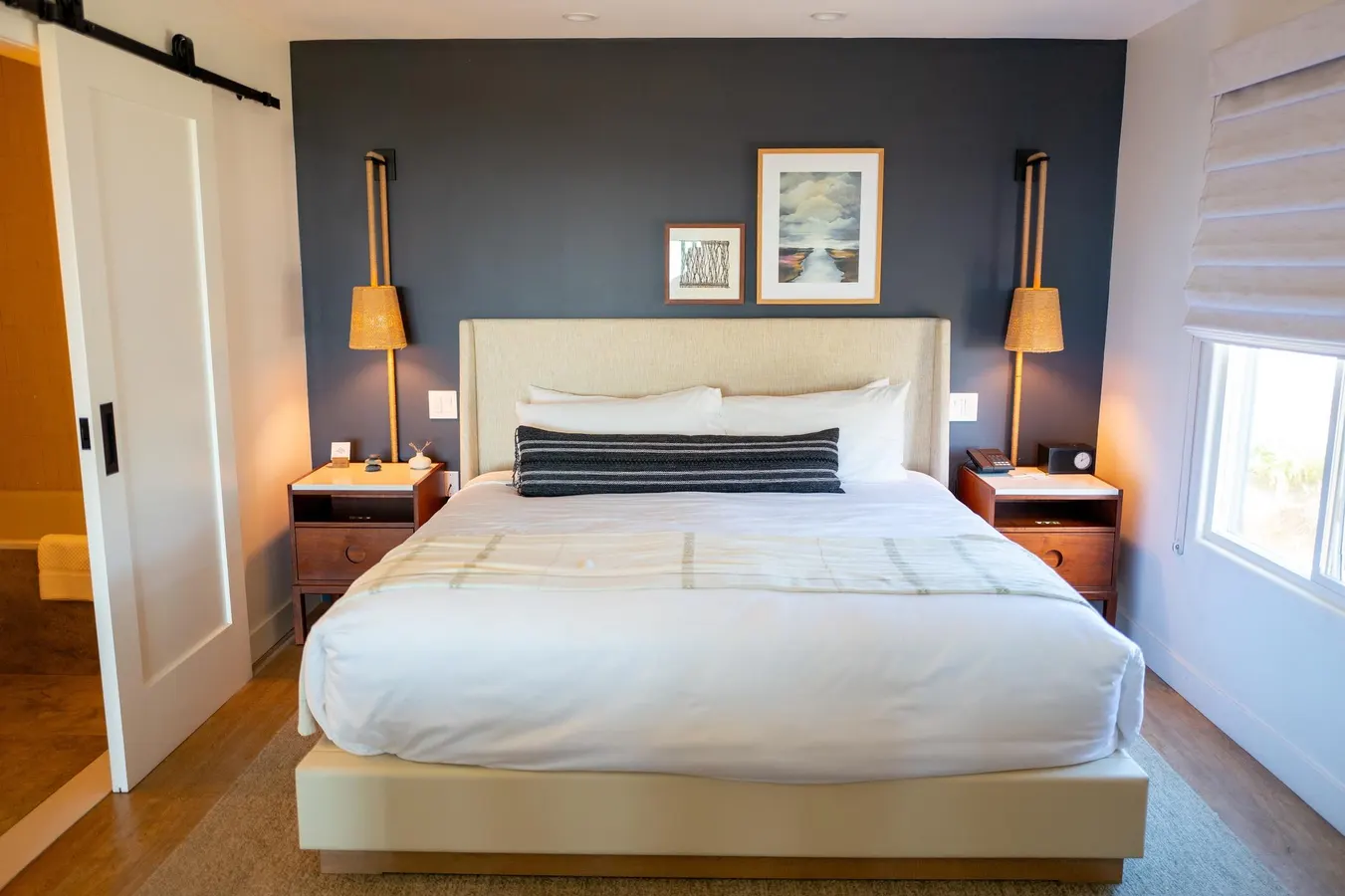By Contributor,Joan Michelson,Smith Collection
Copyright forbes

Hotel room at Sanctuary Beach Resort, Marina, California, August 4, 2025. (Photo by Smith Collection/Gado/Getty Images)
Gado via Getty Images
It’s conference season and the holidays are upon us when lots of us are traveling and staying in hotels. The American Hotel and Lodging Association (AHLA) says 56% of American adults stay in hotels per year, including 77% of business travelers. Most people check the price, location, amenities like a gym and a restaurant and look at the pictures when booking a room. What we probably don’t think much about is what’s inside those rooms. The furniture, carpet, lighting, what the bed is made of, etc.
There are also sustainability-related ratings that I bet most of us likely do not include in our decision making, unless that’s important to you.
Mindclick CEO JoAnna Abrams says what those furnishings are made of should matter more to us than we think because they can affect our health. “There are various green designations that are basically a certification, or an eco-label for hotels that are demonstrating that they’ve committed to having a third party organization review their practices so you can trust their sustainability,” she explained in an exclusive interview on Electric Ladies Podcast. “Green Key Global is a company that actually goes in and does an assessment, looking across the hotel operations and more, and it’s like a scorecard” that consumers can use too.
JoAnna Abrams, from video on Electric Ladies Podcast
Joan Michelson
Most big business travel is booking by corporate travel buyers, Abrams said. Business Travel Show Europe found in an April 2025 survey that “nearly three-quarters of buyers (73 per cent) build sustainability into their travel programmes, with 46 per cent limiting travel choices to less carbon-intensive options and 44 per cent providing travelers with information on their carbon footprint.” There were 27% who said they “do not currently consider sustainability in their travel programme,” and “a further 18 per cent said their company is in the process of appointing sustainability leadership.”
What do corporate travel buyers look for?
These corporate travel buyers “negotiate contracts with big hotel brands and individual properties for employees to travel at,” Abrams said, so when executives and other employees book their travel, they are booking pre-approved hotels and pricing. Today, “upwards of 70 to 80% of all RFPs are now asking about sustainability,” Abrams noted.
MORE FOR YOU
That means they are “now asking the brands and the individual properties to provide quantitative data around the sustainability achievements of these hotels.” What does “sustainability” mean in the context of a hotel?
Screenshot – Deloitte, percent of bookings w sustainability metrics – 9-2025
Those RFPs ask, for example, about their food and beverage programs, and “What are you doing to reduce and operate efficiently from an energy standpoint? And how much carbon does your hotel generate on a per room night basis? And what are you doing about waste, and how about the ways in which you’re treating your employees and so on. I mean, there’s a long list.”
Hotel brass are emphasizing it too, Abrams said, for example, “Tony Capano, the CEO of Marriott has spoken at major industry conferences, and he’s gone out of his way to point out the significant hockey stick- like growth in requests from the corporate travel buyers for sustainability data from hotels.”
Nutrition labels for the furniture
Mindclick provides the hotel furnishings’ information in what Abrams described as a “nutrition-label” type form to help corporate travel buyers make better choices. “Those nutrition labels attempt to give us an understanding of the health and the impact of these products to us,” to help with our buying decisions, she explained. “Now think about applying that to the products that are in your home, especially. Think about your furnishings, right? So the bed, the carpet, the fabrics, the lighting, all these kinds of things.” They rate those items your “home away from home” when you’re traveling, hotels.
MindClick hospitality screenshot
mindclick.com
“What we do is we look at products throughout every stage of what it takes to create that product, to manufacture it, to package it, to transport it, and then what kind of impact it has while you’re using it. And then when you’re done with it, what do you do? Where does it end up?” They follow global standards for what constitutes a “positive impact to people and the planet.” That includes “every aspect of a product lifecycle,” including the toxins in the materials (or lack thereof), or their operations being run on renewable energy.”
Understanding that reducing the impact of these products on our health and the planet and adapting their manufacturing and purchasing strategies takes time, Abrams said they rate companies and products by the stage they’re in on their sustainability journey. “We call it Starter, Achiever, Leader, because it’s a journey.” That helps both the hotels and the travel buyers make informed decisions when they want to “support a healthier environment for people and the planet.”
Creating a story about that hotel room
A chaise lounge made from recycled material at Brown Dirt Cowboy, $1,950, in San Francisco, Calif. on Wednesday, June 13, 2007. PAUL CHINN/The Chronicle (Photo By Paul Chinn/The San Francisco Chronicle via Getty Images)
San Francisco Chronicle via Getty Images
“So the way to think about it is MindClick is unlocking the story behind those equal labels and certifications…to help you stand out and help you make the most of the investments that you’re already making,” Abrams said.
She related it to the farm to table movement, saying that the certifications are important and the customer wants to see those, but they also want the story , like about who the farmer is and “what was behind this this amazing food I’m about to eat.”
What’s the story behind the carpet or the desk or the bed? “It’s a completely different thing to say the recycled content and the floor you’re walking on came from discarded fishing nets off the coast of Malaysian villages, cleaning up a pollution problem, providing an economy,” as she put it.
They ask a lot of questions about the origin of the items in your hotel room, so they can then tell the story of how those furnishings also help keep you, the guest, and your family healthy, and/or help the local community, for example.
Screenshot – Landmark hotel employees buildig a garden in a Virginia community; https://www.landmarkhotelgroup.com/landmark-hotel-group-makes-a-difference-in-2024-through-community-service/
https://www.landmarkhotelgroup.com/landmark-hotel-group-makes-a-difference-in-2024-through-community-service/
Editorial StandardsReprints & Permissions



